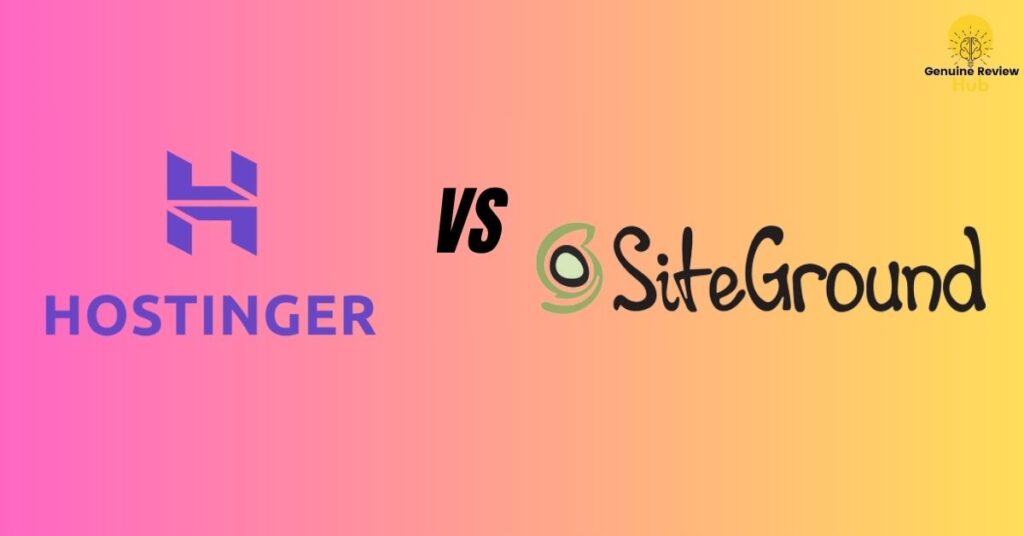If you’re in a hurry and want a brief overview of Hostinger vs. SiteGround, here’s the verdict: Both Hostinger and SiteGround are reputable web hosting providers, but the choice between them ultimately depends on your specific needs.
- Hostinger: Ideal for budget-conscious users and beginners. Offers affordable plans with solid performance and a user-friendly interface.
- SiteGround: Great for those who prioritize top-notch performance, customer support, and security. It’s slightly more expensive but delivers excellent value for businesses and advanced users.
In this comprehensive comparison, we’ll delve deeper into the key factors that will help you decide which hosting provider is the perfect fit for your website in 2023.
Table of Contents
Hostinger vs. SiteGround: Pricing Comparison
When it comes to choosing a web hosting provider, pricing is often one of the first considerations. Let’s dive into a straightforward comparison of Hostinger and SiteGround’s pricing plans to help you make an informed decision.
Hostinger Pricing:
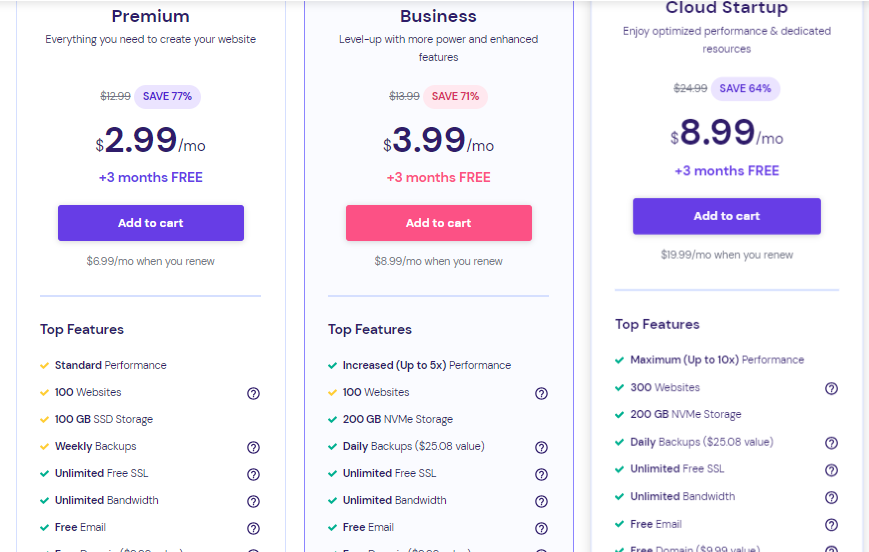
Hostinger is known for its budget-friendly hosting options. They offer three main shared hosting plans:
- Premium Shared Hosting: Starting at just $2.99 per month, this plan is perfect for beginners and small websites. It includes one website, 100GB of SSD storage, and unlimited bandwidth.
- Business Shared Hosting: Priced at $3.99 per month, this plan allows unlimited websites, 200GB of SSD storage, unlimited bandwidth, and a free domain.
- Cloud Startup Shared Hosting: At $8.99 per month, this plan is ideal for e-commerce and business sites. It includes all the Premium plan features, daily backups, and a free SSL certificate.
Hostinger often runs promotions, so it’s essential to note that these prices may change upon renewal. Click here to learn more about Hostinger pricing and plans.
SiteGround Pricing:

SiteGround positions itself as a premium hosting provider, offering excellent performance and customer support. They have three main shared hosting plans:
- StartUp: Starting at $3.99 per month, this plan includes one website, 10GB of SSD storage, and is suitable for approximately 10,000 monthly visits.
- GrowBig: Priced at $6.69 per month, this plan offers unlimited websites, and 20GB of SSD storage, and is suitable for around 25,000 monthly visits.
- GoGeek: At $10.69 per month, this plan is optimized for larger websites and includes 40GB of SSD storage. It can handle approximately 100,000 monthly visits.
It’s important to note that SiteGround’s promotional prices typically increase upon renewal. Click here to learn more about SiteGround pricing and plans.
Verdict:
Hostinger wins when it comes to affordability, making it an excellent choice for budget-conscious users and beginners. However, SiteGround’s slightly higher pricing reflects the added benefits of top-notch performance, excellent customer support, and security features, making it a great investment for businesses and advanced users.
Ultimately, your choice between Hostinger and SiteGround should align with your specific needs and budget. Take into account the long-term costs when considering any hosting provider, as promotional prices often change upon renewal.
Hostinger vs. SiteGround: Performance Comparison
Performance is a critical factor when selecting a web hosting provider. Let’s put Hostinger and SiteGround head-to-head in terms of performance to help you gauge which one suits your website’s needs.
Hostinger Performance:
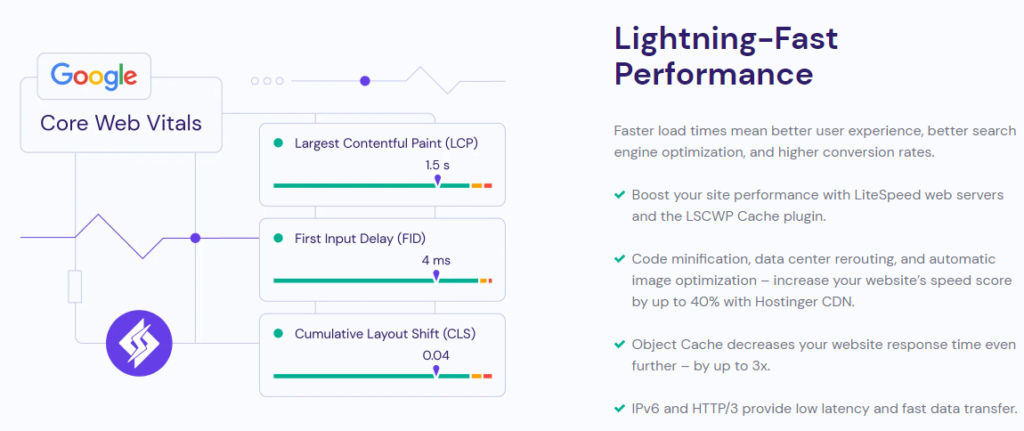
- Speed: Hostinger offers impressive loading speeds. They utilize LiteSpeed web servers, SSD storage, and a global Content Delivery Network (CDN) to ensure that your website loads swiftly, providing an excellent user experience.
- Uptime: Hostinger boasts a strong uptime record, often exceeding 99.9%. This means your website is likely to be up and running reliably, minimizing downtime.
- Data Centers: Hostinger has data centers in multiple locations worldwide, allowing you to choose a server location close to your target audience for faster loading times.
SiteGround Performance:
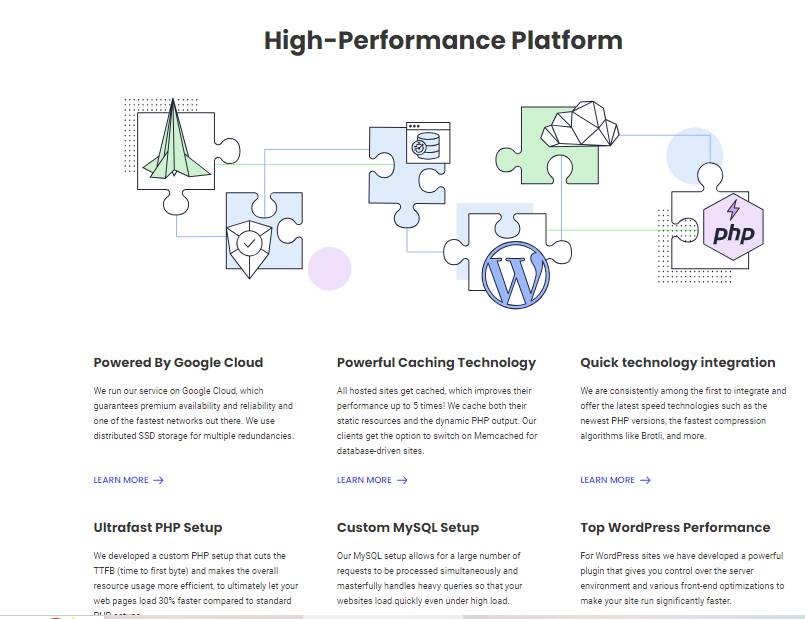
- Speed: SiteGround is renowned for its exceptional speed. They leverage the latest technologies like SSD storage, HTTP/2, and NGINX server setups to deliver lightning-fast loading times.
- Uptime: SiteGround is equally reliable with an uptime record exceeding 99.9%. Their proactive server monitoring helps prevent issues and ensures your website remains online.
- Data Centers: SiteGround offers data centers strategically placed on different continents, enabling you to select a server location that minimizes latency for your visitors.
Click here to learn more about SiteGround performance
Verdict:
In terms of performance, both Hostinger and SiteGround shine. They invest in cutting-edge technologies and infrastructure to deliver fast loading speeds and high uptime, crucial for a successful online presence. Your choice between the two should depend on your specific needs and priorities.
- Hostinger is an excellent choice if you’re on a budget and still want solid performance. It’s ideal for personal blogs, small websites, and those who prioritize affordability.
- SiteGround is the go-to option for users who demand top-notch performance. It’s perfect for businesses, e-commerce sites, or anyone who values a lightning-fast website and is willing to invest a bit more in hosting.
Remember that other factors like pricing, features, and customer support should also weigh into your decision-making process. The ideal hosting provider balances performance with other essential aspects to create a seamless web hosting experience.
Hostinger vs. SiteGround: User-Friendliness Comparison
When it comes to web hosting, user-friendliness can significantly impact your experience, especially if you’re new to website management. Let’s compare Hostinger and SiteGround in terms of user-friendliness to help you choose the right hosting platform for your needs.
Hostinger User-Friendliness:
- Control Panel: Hostinger employs a custom control panel that’s intuitive and user-friendly, even for beginners. It simplifies tasks like website management, domain setup, and email configuration.
- One-Click Installer: Hostinger provides a one-click installer for popular applications like WordPress, making it effortless to set up your website or blog.
- Website Builder: They offer a beginner-friendly website builder called Zyro, which comes with templates and drag-and-drop functionality to help you create your site without technical expertise.
- Knowledge Base: Hostinger’s knowledge base is comprehensive, featuring step-by-step tutorials and articles to assist users in resolving common issues.
Click here to learn more about Hostinger user-friendliness
SiteGround User-Friendliness:
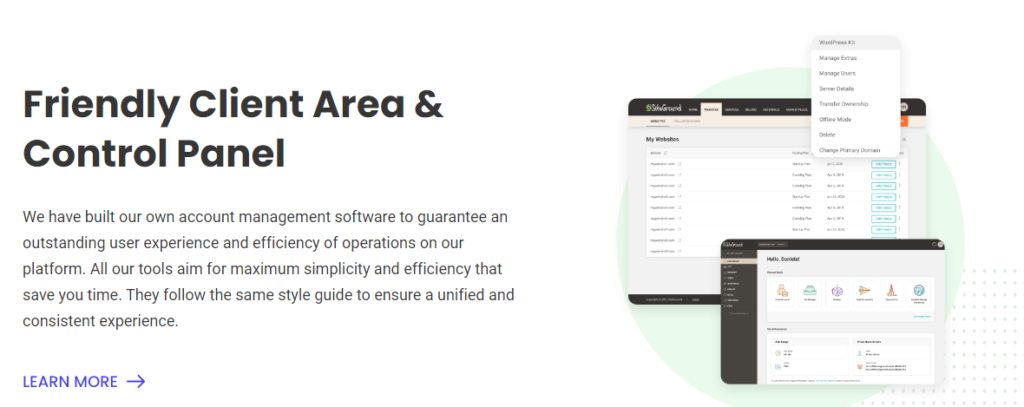
- cPanel: SiteGround utilizes the widely-used cPanel control panel, which is known for its user-friendly interface. It’s particularly beneficial if you’re already familiar with cPanel.
- One-Click Installer: SiteGround offers a one-click installer for various applications, including WordPress, Joomla, and Drupal, simplifying the installation process.
- Website Builder: While SiteGround doesn’t have its own website builder, it integrates seamlessly with popular website builders like Weebly and WordPress, allowing you to create your site with ease.
- Support and Documentation: SiteGround’s support team is renowned for its responsiveness and helpfulness. They also maintain a knowledge base with extensive guides and tutorials.
Verdict:
Both Hostinger and SiteGround prioritize user-friendliness, but they employ different control panels. Your preference may depend on your prior experience and familiarity with these interfaces.
- Hostinger stands out for its custom control panel, which is particularly well-suited for beginners. The inclusion of a beginner-friendly website builder, Zyro, makes it an excellent choice for those without technical expertise.
- SiteGround appeals to users who are comfortable with cPanel or who prefer the reliability of a well-established control panel. It also excels in customer support, making it a solid option for those who value assistance when needed.
Ultimately, the user-friendliness of a hosting provider is a personal preference. Consider your comfort level with control panels and whether you require a website builder as you weigh the pros and cons of Hostinger and SiteGround.
Hostinger vs. SiteGround: Security Comparison
Ensuring the security of your website is paramount. Let’s assess the security measures provided by Hostinger and SiteGround to help you make an informed choice regarding your hosting platform.
Hostinger Security:

- Free SSL Certificate: Hostinger includes a free SSL certificate with all hosting plans. This ensures that data transmitted between your website and visitors is encrypted, enhancing security.
- Server Security: Hostinger employs various security protocols and tools to safeguard its servers, including firewalls and intrusion detection systems.
- Regular Backups: They offer automatic daily backups for premium and business hosting plans, allowing you to restore your website in case of data loss or emergencies.
- Security Plugins: Hostinger supports the use of security plugins, including those for WordPress, which can further fortify your website against threats.
SiteGround Security:
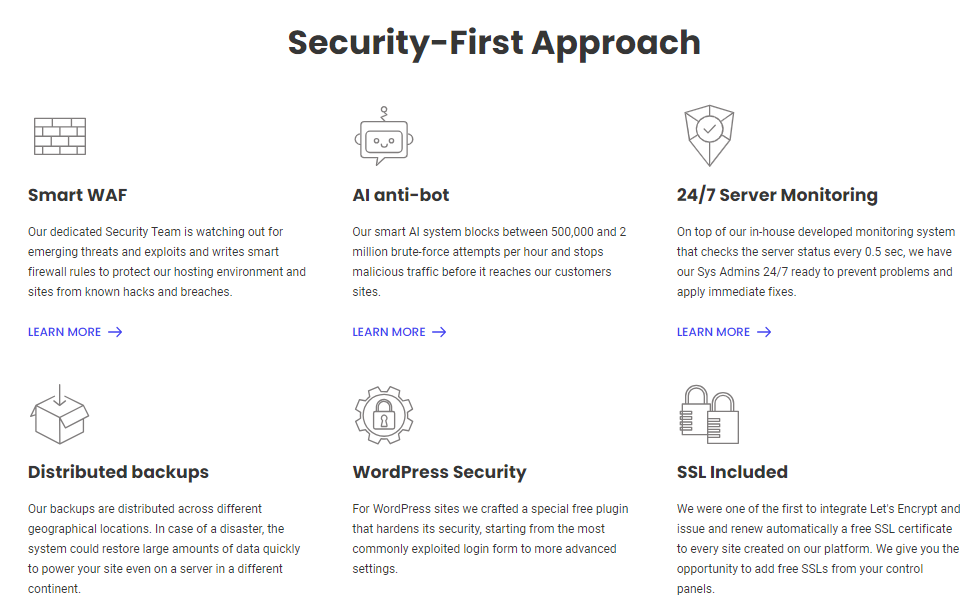
- Free SSL Certificate: SiteGround also provides free SSL certificates to all users, encrypting data transmission and enhancing website security.
- Server Security: SiteGround is known for its robust server security, including account isolation, proactive monitoring, and a web application firewall (WAF) to block malicious traffic.
- Automatic Backups: They offer daily automatic backups on all plans. You can restore your website easily if something goes wrong.
- Security Tools: SiteGround offers a range of security tools and features, such as a unique AI anti-bot system, to protect your site from various threats.
Verdict:
Both Hostinger and SiteGround prioritize security, which is reassuring for website owners. They offer essential security features such as free SSL certificates, server security measures, and regular backups.
However, SiteGround goes the extra mile with its AI anti-bot system, proactive monitoring, and web application firewall, making it an excellent choice for those who require advanced security measures.
Hostinger vs. SiteGround: Pros and Cons
Choosing the right web hosting provider is a pivotal decision for your online presence. To assist you further, let’s break down the pros and cons of Hostinger and SiteGround to help you make an informed choice.
Pros of Hostinger:
- Affordability: Hostinger is extremely budget-friendly, making it an excellent choice for individuals and small businesses.
- Speed: They provide fast loading times, thanks to technologies like LiteSpeed servers and SSD storage.
- User-Friendly: Hostinger’s custom control panel and beginner-friendly features are ideal for those new to web hosting.
- Free SSL: All plans come with a free SSL certificate, enhancing website security.
- Multiple Data Centers: They have data centers in various global locations, allowing you to select a server closer to your target audience for improved performance.
Cons of Hostinger:
- Limited Resources: While suitable for small to medium-sized websites, Hostinger’s lower-tier plans may not be sufficient for high-traffic or resource-intensive sites.
- Renewal Pricing: Be aware that promotional prices can significantly increase upon plan renewal.
Pros of SiteGround:
- Outstanding Performance: SiteGround is renowned for its exceptional speed and uptime, ensuring an excellent user experience.
- Top-Notch Support: Their customer support team is highly responsive and knowledgeable, providing assistance when you need it.
- Security: SiteGround offers advanced security measures, including account isolation, proactive monitoring, and an AI anti-bot system.
- Scalability: They offer a range of hosting options, making it suitable for websites of all sizes.
- Data Centers: With data centers across continents, you can optimize server locations for improved load times.
Cons of SiteGround:
- Pricing: SiteGround’s premium features come at a slightly higher cost, which might not be the best fit for those on a tight budget.
- cPanel Familiarity: If you’re accustomed to other control panels, adjusting to cPanel may take some time.
Verdict:
Choosing between Hostinger and SiteGround ultimately depends on your specific needs and priorities. Hostinger is an excellent choice for budget-conscious users and beginners looking for affordability and ease of use. On the other hand, SiteGround excels in performance, customer support, and security, making it a solid investment for businesses and advanced users.
Hostinger vs. SiteGround: Summary
| Feature | Hostinger | SiteGround |
| Pricing | Affordable, budget-friendly plans | Slightly higher prices for premium features |
| Speed | Fast loading times with LiteSpeed and SSDs | Exceptional speed and performance |
| User-Friendly | Custom control panel, beginner-friendly | cPanel interface, familiar to many |
| Security | Free SSL, server security, regular backups | Advanced security measures, AI anti-bot |
| Customer Support | Responsive, knowledgeable support team | Highly regarded customer support |
| Scalability | Suitable for small to medium-sized websites | Offers hosting options for all website sizes |
| Data Centers | Multiple data centers worldwide | Data centers on different continents |
| Ideal For | Budget-conscious users, beginners | Businesses, advanced users, high performance |
| Promotional Pricing | Attractive promotional prices | Promotional prices that increase on renewal |
In the comparison of Hostinger and SiteGround, Hostinger emerges as the preferred choice for several compelling reasons:
- Affordability: Hostinger offers hosting plans that are exceptionally budget-friendly, making it an ideal choice for individuals, small businesses, and those looking to save on hosting costs.
- Speed: Hostinger’s use of LiteSpeed servers and SSD storage ensures fast loading times, providing a smooth user experience for your website visitors.
- User-Friendly: Hostinger’s custom control panel and user-friendly features make it an excellent option for beginners in the world of web hosting. The platform simplifies tasks such as website management and domain setup.
- Security: Hostinger takes security seriously, offering a free SSL certificate, server security measures, and regular backups to keep your website safe.
- Multiple Data Centers: With data centers in various locations around the world, Hostinger enables you to choose a server close to your target audience, which can result in improved website performance.
While SiteGround is a reputable hosting provider known for its performance, customer support, and security features, Hostinger’s affordability, speed, and user-friendliness make it the better choice for those seeking cost-effective hosting without compromising on essential features.
It’s important to note that the choice between Hostinger and SiteGround ultimately depends on your specific needs and priorities. However, for those looking for a hosting solution that offers excellent value for money in 2023, Hostinger stands out as the top pick.

